- What Is A Data Science Hackathon?
- Why Conduct Data Science Hackathons?
- Step-by-Step Approach
- Key Considerations
- Evaluating Data Science Hackathons
- Leveraging Hackathon Platforms
- Hosting Data Science Hackathons: Best Practices
- Frequently Asked Questions (FAQs)
What Is A Data Science Hackathon?: Find Out All About It In This Ultimate Guide

Hackathons have become a popular tool for hiring and engagement in various industries. Hackathons are events where individuals from a common field (usually engineering) come together to solve a specific problem. These events allow companies to assess the skills and creativity of participants, providing them with an opportunity to showcase their abilities.
Different types of hackathons, but the ones that have recently been rising in popularity are data science hackathons. Data science hackathons have gained popularity due to the increasing demand for data-driven insights in various industries. Whether you are a seasoned data scientist or a novice, participating in a data science hackathon can be a great way to enhance your data science skills while networking with like-minded individuals.
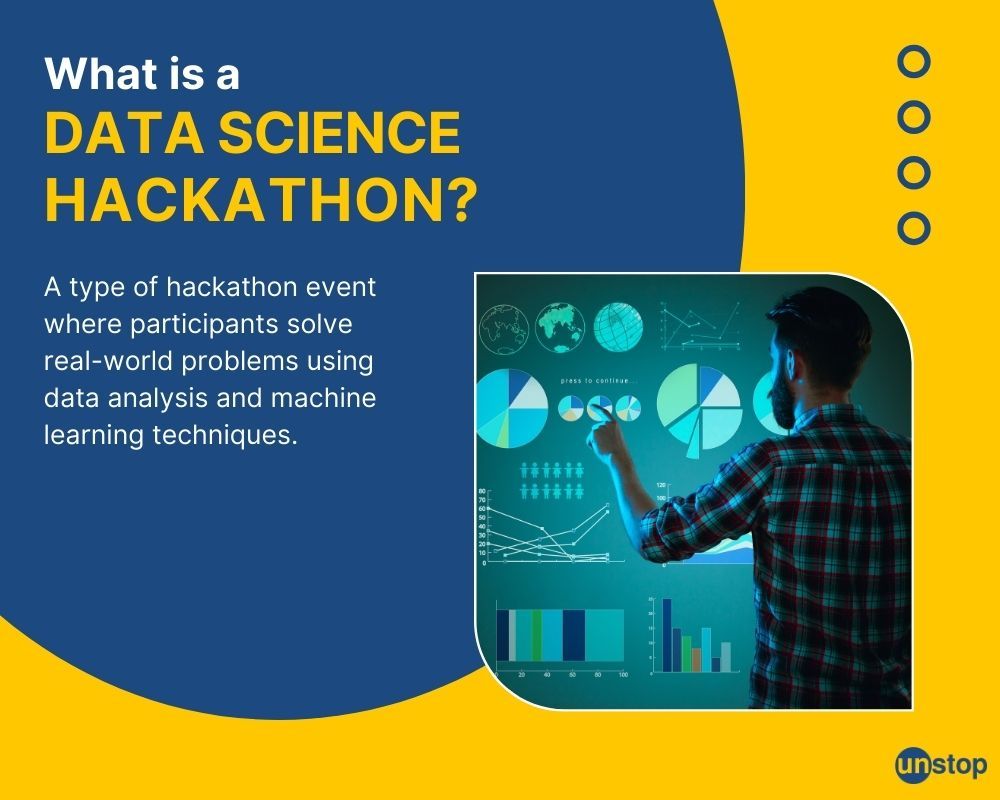
What Is A Data Science Hackathon?
Data science hackathons are events where participants collaborate to solve real-world problems using data analysis and machine learning techniques. These hackathons provide a platform for data scientists, programmers, and domain experts to showcase their skills and creativity. Participants work in teams to develop innovative solutions within a limited timeframe, often competing for prizes or recognition. Hackathons also benefit companies in building a talent pipeline and exploring use cases of cutting-edge technologies.
Why Conduct Data Science Hackathons?
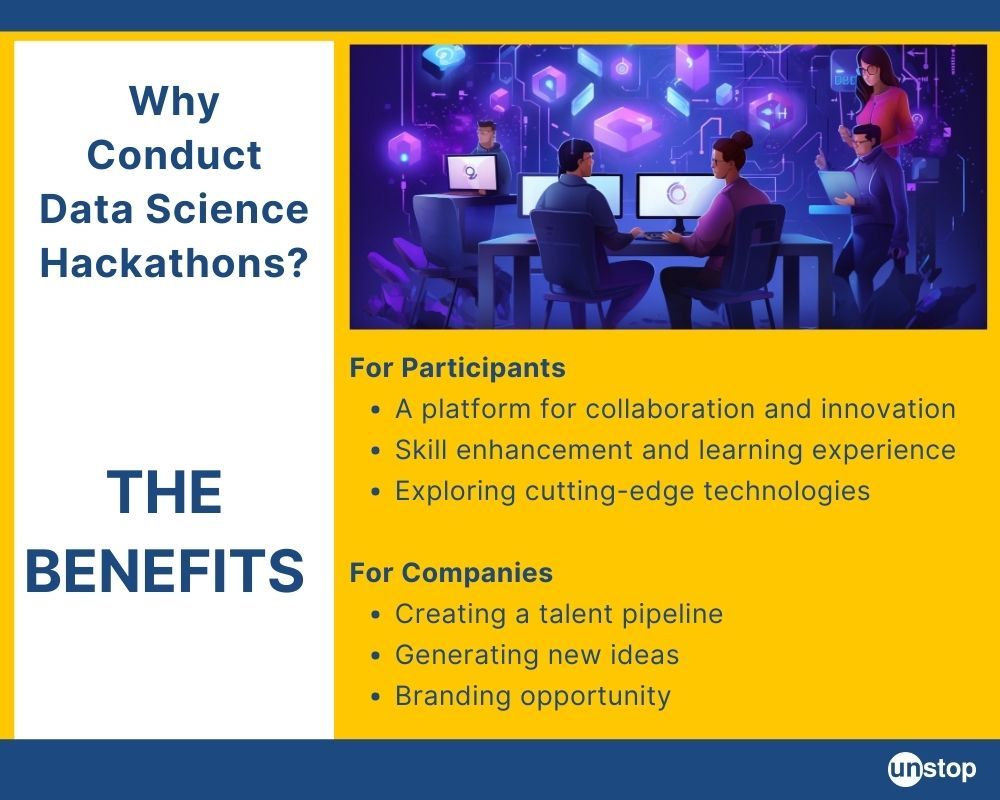
Some key reasons why hackathons are important in data science include:
For Participants
Opportunity for Collaboration and Innovation
-
Hackathons bring together people with different skill sets and backgrounds, allowing them to collaborate on challenging data problems.
-
This collaborative environment fosters innovation as participants combine their expertise to develop creative solutions.
Skill Enhancement and Learning Experience
-
Hackathons provide a platform for participants to enhance their technical skills through hands-on experience with real-world datasets.
-
Industry experts often mentor participants during these events, offering valuable guidance and insights into best practices.
Exploration of Cutting-Edge Technologies
-
Hackathons allow companies and participants to explore new technologies through the solutions developed by participants.
-
Participants can stay at the forefront of advancements in data science and leverage innovative approaches in their operations.
For Companies
Talent Identification
-
Companies can use hackathons as a way to identify potential talent by observing how individuals approach problem-solving. As participants work together in teams, companies also have the chance to observe their teamwork skills, and creative thinking in action.
-
Additionally, it serves as an opportunity for companies to recruit top performers who demonstrate exceptional technical and soft skills during the event.
Generating Ideas
-
Hackathons serve as a breeding ground for innovative ideas that can be further developed into viable products or services. By providing a supportive workspace where participants can freely experiment with new techniques and technologies, hackathons encourage out-of-the-box thinking and foster innovation.
-
Hackathon participants often bring fresh perspectives that challenge existing practices and drive organizational growth. These intense, collaborative sessions bring together individuals from diverse backgrounds. Their unique backgrounds and experiences can lead to breakthrough solutions that may not have been considered otherwise.
Branding Opportunities
-
Hosting a hackathon allows companies to showcase their brand, attract potential customers, and establish themselves as industry leaders.
-
By advertising the event and inviting industry experts to participate or judge the projects, companies gain visibility within the community. This exposure not only helps in marketing their products or services but also enhances their reputation as an innovative organization.
Step-by-Step Approach To Organizing a Data Science Hackathon
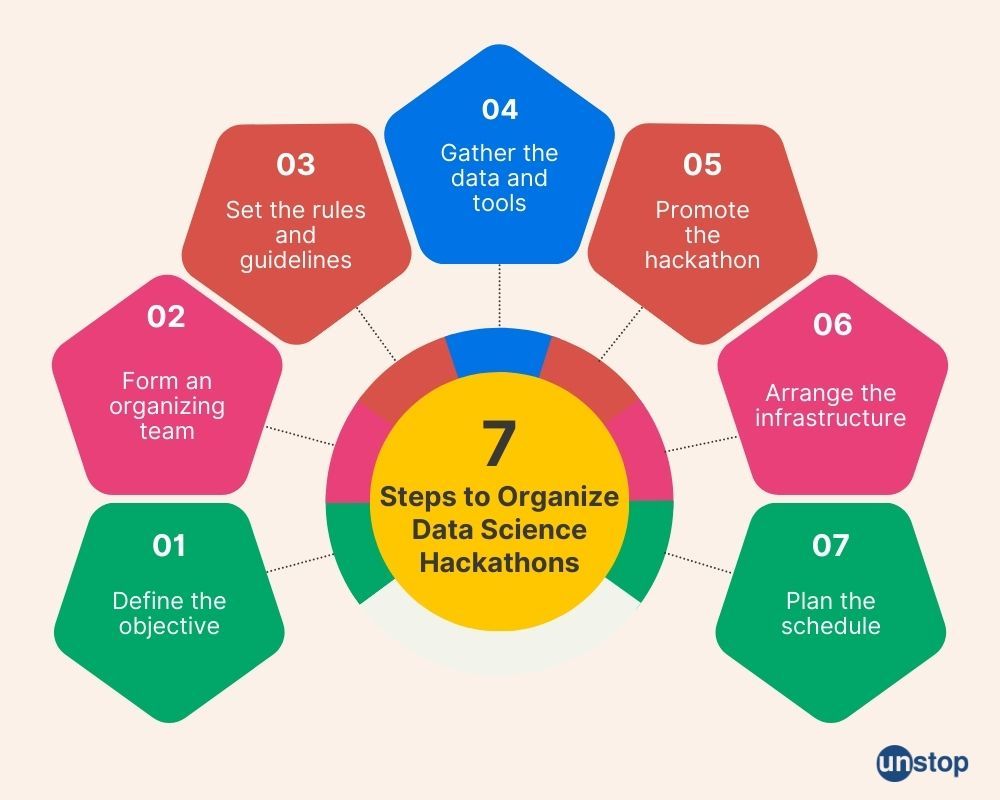
Now that we’ve understood what is data science hackathon and more importantly, how it benefits organizations, it’s time to dig into the process of organizing a data science hackathon. Here is a brief overview of the key steps involved, that can help create a successful and engaging event:
-
Define the Objective: Clearly define the objective of the hackathon, whether it is to solve a specific problem, explore new datasets, or develop innovative data-driven solutions. This will help guide the participants and set the direction for the event.
-
Form a Team: Assemble a team of organizers who are experienced in data science and have a good understanding of the hackathon process. This team will plan and execut the event, undertaking tasks such as securing a venue, arranging for necessary resources, and promoting the hackathon.
-
Set the Rules and Guidelines: Establish the rules and guidelines for the hackathon, including the duration, eligibility criteria, evaluation criteria, and any specific requirements or constraints. Clear guidelines will ensure fairness and provide a framework for participants to work within.
-
Gather Data and Tools: Identify and gather relevant datasets and tools that participants can use during the hackathon. Ensure that the data is clean, well-documented, and accessible to all participants. Additionally, provide a list of recommended tools and resources that can aid participants in their analysis and modeling tasks. Cloud-based environments like Google Colab and others allow participants to write code, analyze data, and develop machine learning models.
-
Promote the Hackathon: Create a marketing plan to promote the hackathon and attract participants. Utilize various channels such as social media, online communities, and professional networks to reach out to data scientists, students, and professionals who may be interested in participating.
-
Arrange for Infrastructure: Make sure to arrange for the necessary infrastructure, including a suitable venue with high-speed internet access, power outlets, and comfortable seating arrangements. Consider providing additional resources such as cloud computing credits or access to specialized software.
-
Plan the Schedule: Develop a detailed schedule for the hackathon, including registration, team formation, data exploration, model development, and final presentations. Allocate sufficient time for participants to collaborate, iterate on their solutions, and seek guidance from
Key Considerations for Organizing a Data Science Hackathon
To organize a data science hackathon, it's important to consider the timeframe, explore the potential of hosting such events at universities:
Timeframe: Short or Long?
The timeframe for a hackathon can vary depending on the complexity of the problem and desired outcomes. It can range from one day to several weeks, allowing participants enough time to work on their projects. The availability of resources and participants can also influence the duration.
Shorter hackathons, typically lasting for a day or two, are ideal for tackling smaller challenges or focusing on specific aspects of data analysis. On the other hand, longer hackathons spanning several weeks allow participants to dive deeper into complex problems and develop more comprehensive solutions.
Conducting/Sponsoring Hackathons as University Events
Organizations can collaborate with universities to host hackathons or sponsor university hackathons. Universities often partner with industry sponsors when organizing data science hackathons to expose participants to real-world challenges and industry practices.
Many universities host data science hackathons as a means to engage students, promote interdisciplinary collaboration, and foster innovation within their academic community. These events provide an excellent platform for students from different disciplines to come together and apply their skills in real-world scenarios.
Leveraging Existing Infrastructure
One advantage of hosting hackathons at universities is that they can leverage existing infrastructure and resources. Universities have access to state-of-the-art computing facilities, research labs, libraries, and experts in various fields who can contribute valuable insights during the event. This creates an environment conducive to learning, experimentation, and networking among participants.
Evaluating Data Science Hackathons
Data science hackathons usually consist of multiple rounds, each presenting participants with specific challenges or problem statements to tackle. Each round of a data science hackathon may have different evaluation criteria.
Factors such as the accuracy of predictions, creativity in feature engineering, or model interpretability can be considered during the evaluation process. This ensures that participants are not only focused on achieving accurate results but also encouraged to think creatively and develop innovative solutions.
To maintain fairness in evaluating the solutions developed by participants, some hackathons incorporate peer reviews or expert judging panels. This helps ensure that the judging process is unbiased and transparent.
Leveraging Hackathon Platforms
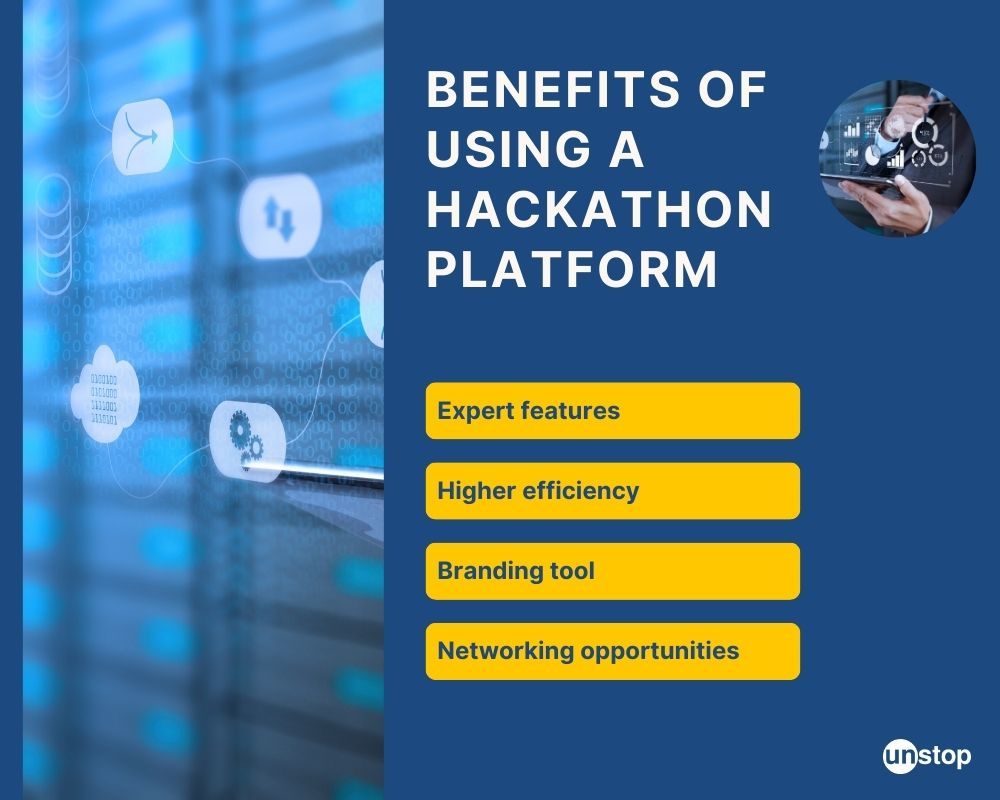
Hackathon platforms offer a range of benefits for companies looking to gain positive publicity and efficiently organize data science events. By leveraging these platforms, companies can showcase their commitment to innovation and support for the data science community.
Expert features: These platforms provide features like live leaderboards, project showcases, and social media integration, which enhance engagement among participants and spectators alike. Participants can track their progress on the leaderboard in real-time, while project showcases allow them to display their work to a wider audience. Social media integration enables easy sharing of updates and achievements, further amplifying the event's reach.
Higher Efficiency: Dedicated hackathon platforms also streamline participant registrations, team formations, submission deadlines, and communication throughout the event. With all these functionalities in one place, organizers can save time and effort by managing everything through a single platform.
Branding Tool: Sponsors also have an opportunity to use hackathon platforms as a branding tool. They can prominently display their logos throughout the event's online presence, including the hackathon platform's website and social media pages. This not only increases brand visibility but also demonstrates their support for innovation and the data science community.
Networking Opportunities: In addition to PR benefits and event organization advantages, hackathons hosted on these platforms offer participants an opportunity to network with like-minded individuals in the industry. It helps them expand their professional connections by interacting with fellow data scientists, industry experts, potential employers, or collaborators.
Connect with an ever-growing community of 7Mn+ students and early professionals by organizing a Data Science Hackathon with Unstop. Explore the platform here.
Hosting Data Science Hackathons: Best Practices
To ensure a successful data science hackathon, it is crucial to implement certain best practices that can help prevent common mistakes:
Clearly Define the Problem Statement and Provide Well-Curated Datasets
One of the most important aspects of a data science hackathon is to have a clearly defined problem statement. This helps participants understand the task at hand and ensures they are working towards a common goal. Providing well-curated datasets gives participants access to high-quality data that they can use for their analysis and modeling.
Encourage Effective Communication and Collaboration within Teams
Effective communication and collaboration contribute to the success of any hackathon. To facilitate this, organizers should provide dedicated spaces for brainstorming, knowledge sharing, and progress tracking. This could include online forums or platforms where teams can discuss ideas, ask questions, and share insights.
Set Realistic Timelines and Expectations
Hackathons can be intense events that require participants to work under tight deadlines. However, it is important to set realistic timelines and expectations to avoid burnout among participants. Providing sufficient time for exploration, experimentation, and iteration allows teams to produce higher-quality solutions without feeling rushed.
Foster a Supportive Environment
Creating a supportive environment is essential for encouraging learning from failures and promoting inclusivity in data science hackathons. Emphasize the value of diverse perspectives by encouraging teams to collaborate with individuals from different backgrounds or areas of expertise. This not only enhances creativity but also promotes teamwork.
By implementing these best practices in data science hackathons, organizers can minimize mistakes while maximizing the potential for innovative solutions to emerge.
To conclude, data science hackathons serve as an invaluable platform for aspiring data scientists to showcase their skills, collaborate with like-minded individuals, and solve real-world problems through data analysis. These events not only provide an opportunity to learn from industry experts but also foster innovation and creativity by encouraging participants to think outside the box. Whether you are a beginner looking to gain experience or a seasoned professional aiming to stay updated with the latest trends in data science, participating in a hackathon can be a rewarding experience.
Frequently Asked Questions (FAQs)
1. What’s the benefit of hosting a data science hackathon on a hackathon platform?
Hosting a data science hackathon on a hackathon platform offers several benefits. It provides a centralized space to promote and manage events, reaching a wider audience. The platform streamlines registration and team formation, saving time and ensuring a smoother experience. It also offers a structured framework, guidelines, and communication tools, enhancing organization and collaboration.
2. What technical skills are evaluated during a data science hackathon?
Knowing programming languages such as Python or R is essential for most data science hackathon participants. Participants are also assessed on their familiarity with machine learning algorithms, statistical analysis techniques, and data visualization tools. However, specific requirements depend on the competition.
3. Do data science hackathon allow individual participation?
In many cases, participants are allowed to participate individually or as part of a team. However, it is often beneficial to collaborate with others as it allows for diverse perspectives and skill sets. Working in teams also fosters teamwork and enhances the overall learning experience.
4. How long do data science hackathons typically last?
The duration of data science hackathons can vary significantly, ranging from a few hours to several days. Some competitions may have pre-defined timeframes within which participants need to complete their projects, while others may allow for more flexible timelines.
5. Are there any prizes awarded in data science hackathons?
Yes, most data science hackathons offer prizes to the winners based on various criteria such as accuracy, creativity, and innovation. Prizes can range from cash rewards and job opportunities to recognition within the industry.
Suggested Reads:
I’m a reader first and a writer second, constantly diving into the world of content. If I’m not writing or reading, I like watching movies and dreaming of a life by the beach.
Login to continue reading
And access exclusive content, personalized recommendations, and career-boosting opportunities.
Subscribe
to our newsletter
Blogs you need to hog!
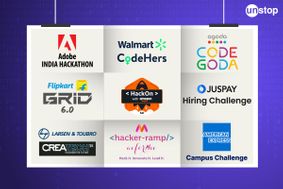
Organize Hackathons: The Ultimate Playbook With Past Case Studies

What is Campus Recruitment? How To Tap The Untapped Talent?

Lateral Hiring: A Complete Guide To The Process, Its Benefits, Challenges & Best Practices
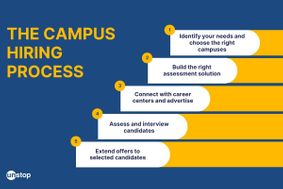











Comments
Add comment